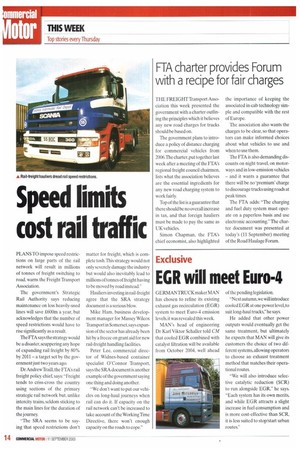Speed limits cost rail traffic
Page 14

If you've noticed an error in this article please click here to report it so we can fix it.
PLANS TO impose speed restrictions on large parts of the rail network will result in millions of tonnes of freight switching to road, warns the Freight Transport Association.
The government's Strategic Rail Authority says reducing maintenance on less heavily-used lines will save £.600m a year, but acknowledges that the number of speed restrictions would have to rise significantly as a result.
The ETA says the strategy would be a disaster, scuppering any hope of expanding rail freight by 80% by 2011 — a target set by the government just two years ago.
Dr Andrew Traill. the FTA's rail freight policy chief. says: "Freight tends to criss-cross the country using sections of the primary strategic rail network but, unlike intercity trains, seldom sticking to the main lines for the duration of the journey.
"The SRA seems to be saying that speed restrictions don't matter for freight, which is complete tosh.This strategy would not only severely damage the industry but would also inevitably lead to millions of tonnes of freight having to be moved by road instead."
Hauliers investing in rail-freight agree that the SRA strategy document is a serious blow.
Mike Ham, business development manager for Massey Wilcox Transport in Somerset, says expansion of the sector has already been hit by a freeze on grant aid for new rail-freight handling facilities.
Peter Lee, commercial director of Widnes-based container specialist O'Connor Transport, says the SRA document is another example of the government saying one thing and doing another.
"We don't want to put our vehicles on long-haul journeys when rail can do it. If capacity on the rail network can't be increased to take account of the Working Time Directive, there won't enough capacity on the roads to cope."








































































































































































































